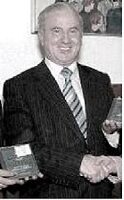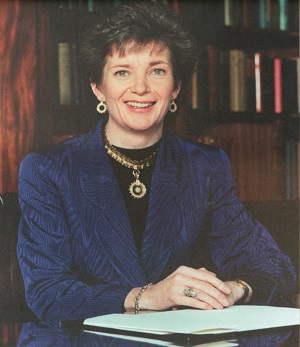
Michael Davitt in 1904
(The Davitt Museum)
Michael Davitt (1846-1906), ‘the Father of the Irish Land League’, social reformer, Member of Parliament, international humanitarian, and author, was a great champion of education for the empowerment of men and women. In his book Leaves from a Prison Diary (1885), he deplored the limited educational opportunities for girls and strongly recommended that the system should provide equal opportunities for both genders at all levels.
Highly intelligent and self-educated to a great extent, Michael Davitt’s reading embraced English literature, history, politics, economics, biographies, and the Bible. His intellectual curiosity turned every experience into a learning opportunity, especially his numerous journeys abroad. Shortly after his arrival in Philadelphia in July 1878, on his first visit abroad following, he explored the historic sites of the city, recording the experience in his diary. He visited Independence Hall, where the American founding fathers signed the Declaration of Independence on July 4, 1776, and where the US Constitution was adopted on September 17, 1787, Congress Hall, where Congress met from 1790 to 1800 when the city was the first capital of the US, as well as Christ Church, where he saw in the adjacent burial-ground the grave of Benjamin Franklin, who helped draft the US Declaration of Independence and the Constitution. Amongst other sites and places, he also saw the Liberty Bell, which rang out on July 4, 1776, the Free Library, Fairmount Park, and of course, the local prison. Thereafter, he really enjoyed travelling and loved exploring different places, always learning and eager to see how things could be improved in Ireland. He loved reading, writing and when the opportunities arose attending theatres, concerts and operas. According to Dr T. W. Moody, Davitt had some knowledge of French, Spanish, German, Italian and Latin, which is amazing in view of his limited learning opportunities
Davitt’s biggest intellectual accomplishment was the publication of six books, an enormous achievement having regard to his life and disability (he had to learn to write with his left hand following the amputation of the right one). His six books encapsulate his enormous ability, concentration, dedication and work-rate as well as his desire to disseminate knowledge and ideas for the betterment of society. No other Irish political figure has bequeathed to posterity such a valuable record of contemporary affairs.
Appreciating the role of education as a source of empowerment for individuals, families, society and the economy, he made several recommendations in his writings for widening access to everyone able and willing to avail of it. After his own experience of the Mechanics’ Institute in Haslingden, England, he had a big interest in the provision of suitable evening courses for working people, and supported the establishment of similar Institutes in Ireland. Michael Davitt believed strongly in the transformative role of education in developing the talents of people, in enhancing their opportunities to earn their livelihoods, in improving their living conditions, as well as enabling them to enjoy social and cultural activities. He deplored the limited educational opportunities then available, and really campaigned all his life for their improvement.

